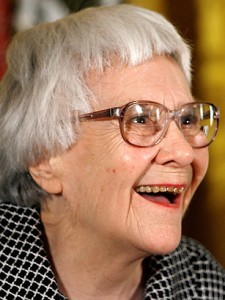The records of history are filled with people who became full of themselves. Fame, prominence, and success seem to have been their goal, and an end in themselves. Too many athletes are called heroes, and too many politicians are deemed statesmen long before either have earned the title. Many become legends in their own minds, and others are allowed legendary status long before they deserve it. But what of those quiet giants who walk through the land never seeking fame or status, just doing what they do for the sheer satisfaction of it? One such person is Nelle Harper Lee.
 What would we think today of a writer that hit the business with a splash but was never able to repeat his or her success? And what if that author made another attempt but gave up in frustration, never to write again? One of the questions most acquisition editors seem to have in their mind these days is, “Yeah that looks good but can they make a series out of it?” What would their opinion be as they read through the proposal of an unassuming little lady from rural Alabama who had no marketing plan, no future titles in mind, and no Web site or Facebook page?
What would we think today of a writer that hit the business with a splash but was never able to repeat his or her success? And what if that author made another attempt but gave up in frustration, never to write again? One of the questions most acquisition editors seem to have in their mind these days is, “Yeah that looks good but can they make a series out of it?” What would their opinion be as they read through the proposal of an unassuming little lady from rural Alabama who had no marketing plan, no future titles in mind, and no Web site or Facebook page?
The question is moot because Nelle Harper Lee won’t be sending a proposal out to anyone. She never has in the fifty years since To Kill a Mockingbird hit the shelves. Since then, she has made few speeches or appearances, choosing instead to spend most of her time with her sister in sleepy little Monroeville, Alabama. She did write a letter in 2006 to Oprah Winfrey in which she said, “In an abundant society where people have laptops, cell phones, iPods, and minds like empty rooms, I still plod along with books.” While attending a ceremony in 2007 to induct four members into the Alabama Academy of Honor, Lee declined an invitation to address the audience by saying, “It’s better to be silent than to be a fool.”
Harper Lee’s life stands as a testament of a person who never tried to be great or known. She never promoted herself, because she never expected anyone else to like what she wrote. As the publication date approached for her novel, Lee hoped for, “a quick and merciful death at the hands of reviewers.” Caught up in the hoopla of the book’s success and the notoriety of being chief researcher for Truman Capote’s In Cold Blood, Harper Lee never embraced the lime light. She tried to write another novel, but finally set it aside and retired to her world of books, close friends, Mets games, and longer and longer stays in her native Alabama. It’s possible I have even stood right beside her in my hometown of Pensacola, as this is where she and others from the rural areas come to shop on occasion. But I would have never known it. At 85, Nelle Harper Lee is what she has always been, a person with no need of recognition.
When asked by a bookstore owner in New York in 2000 why she never wrote another book, she replied, “I said what I had to say.” But apparently what she did have to say was enough for most. Since its first printing, her story of Atticus Finch, Scout, and the rest of 1930s Alabama, To Kill a Mockingbird has sold at least one million copies every single year for fifty years. And yet, Harper Lee lives in near anonymity in her little hometown of Monroeville. Not that many haven’t tried to bring the fame there. But the town, though it needs every dollar it can get, sees it as its mission to protect their Pulitzer Prize winning author from unwanted intrusion.
Lee once told a friend in Mobile, “People who have made peace with themselves are the people I admire most in this world.” No doubt, she has achieved that ideal.
 Off The Grid News Better Ideas For Off The Grid Living
Off The Grid News Better Ideas For Off The Grid Living
